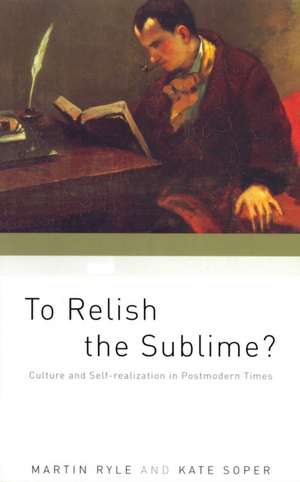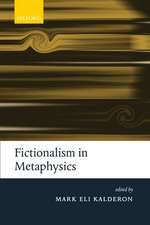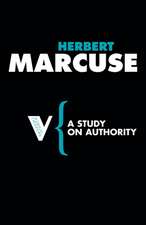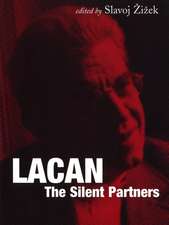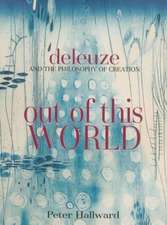To Relish the Sublime?
Autor Martin Ryle, Kate Soperen Limba Engleză Paperback – 17 dec 2002
Preț: 168.63 lei
Nou
Puncte Express: 253
Preț estimativ în valută:
32.27€ • 33.29$ • 27.31£
32.27€ • 33.29$ • 27.31£
Carte disponibilă
Livrare economică 12-26 februarie
Preluare comenzi: 021 569.72.76
Specificații
ISBN-13: 9781859844618
ISBN-10: 1859844618
Pagini: 272
Dimensiuni: 134 x 220 x 20 mm
Greutate: 0.38 kg
Editura: VERSO
ISBN-10: 1859844618
Pagini: 272
Dimensiuni: 134 x 220 x 20 mm
Greutate: 0.38 kg
Editura: VERSO
Notă biografică
Martin Ryle is Senior Lecturer in Continuing Education at the University of Sussex. His previous books include The Politics of Nuclear Disarmament, Ecology and Socialism, and Journeys in Ireland.
Kate Soper teaches philosophy and cultural theory at the University of North London. Her previous works include On Human Needs, What is Nature? Culture, Politics and the Non-Human and, with Verso, Troubled Pleasures.
Kate Soper teaches philosophy and cultural theory at the University of North London. Her previous works include On Human Needs, What is Nature? Culture, Politics and the Non-Human and, with Verso, Troubled Pleasures.
Recenzii
“The idea of culture as a means of self-realisation and an embodiment of universal values has been derided by most progressive critics for more than a generation, and by many reactionary ones too. But perhaps they have all been wrong. This well-informed study of history, politics and literature makes an eloquent case for reinstating it: a powerful and timely book.”—Jonathan Ree
“In a time when culture is said to be ‘everything’, Ryle and Soper are prepared to say what culture is opposed to, and thus to salvage its scarcity and its value. Defending what culture can do for the stubbornly persistent self, their untimely meditation on politics and aesthetics announces the twilight of the Nietzscheans and the dawn, perhaps, of a new cohabitation of cultural politics with literary pleasure. Brave, subtle, and passionately intelligent, this book is a much-needed plea for belief in the culture to which we also demand more democratic access.”—Bruce Robbins
"In a time when culture is said to be 'everything', Ryle and Soper are prepared to say what culture is opposed to, and thus to salvage its scarcity and its value. Defending what culture can do for the stubbornly persistent self, their untimely meditation on politics and aesthetics announces the twilight of the Nietzscheans and the dawn, perhaps, of a new cohabitation of cultural politics with literary pleasure. Brave, subtle, and passionately intelligent, this book is a much-needed plea for belief in the culture to which we also demand a more democratic access." - Bruce Robbins "The idea of culture as a means of self-realisation and an embodiment of universal values has been derided by most progressive critics for more than a generation, and by many reactionary ones too. But perhaps they have all been wrong. This well-informed study of history, politics and literature makes an eloquent case for reinstating it: a powerful and timely book." - Jonathan Ree
“In a time when culture is said to be ‘everything’, Ryle and Soper are prepared to say what culture is opposed to, and thus to salvage its scarcity and its value. Defending what culture can do for the stubbornly persistent self, their untimely meditation on politics and aesthetics announces the twilight of the Nietzscheans and the dawn, perhaps, of a new cohabitation of cultural politics with literary pleasure. Brave, subtle, and passionately intelligent, this book is a much-needed plea for belief in the culture to which we also demand more democratic access.”—Bruce Robbins
"In a time when culture is said to be 'everything', Ryle and Soper are prepared to say what culture is opposed to, and thus to salvage its scarcity and its value. Defending what culture can do for the stubbornly persistent self, their untimely meditation on politics and aesthetics announces the twilight of the Nietzscheans and the dawn, perhaps, of a new cohabitation of cultural politics with literary pleasure. Brave, subtle, and passionately intelligent, this book is a much-needed plea for belief in the culture to which we also demand a more democratic access." - Bruce Robbins "The idea of culture as a means of self-realisation and an embodiment of universal values has been derided by most progressive critics for more than a generation, and by many reactionary ones too. But perhaps they have all been wrong. This well-informed study of history, politics and literature makes an eloquent case for reinstating it: a powerful and timely book." - Jonathan Ree
